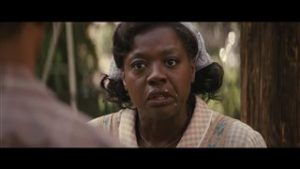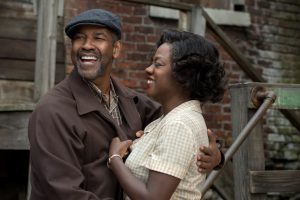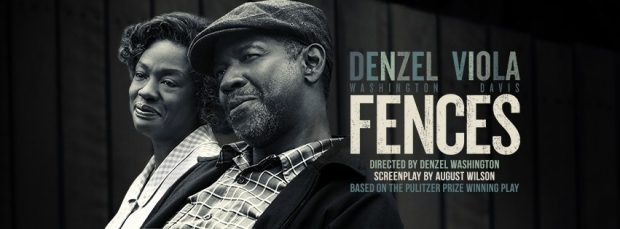Fences
“Fences,” August Wilson’s 1983 Pulitzer Prize-winning masterpiece, has finally found its way to the big screen thanks to actor-director Denzel Washington and Paramount Pictures. It’s the playwright’s screenplay adaptation of the Maxsons, a working-class black family trying to making ends meet in 1950s Pittsburgh.
This film adaptation of August Wilson’s Pulitzer Prize-winning play, is receiving rave reviews by critics and moviegoers alike. The movie along with its cast has been racking up award after award ahead of the Oscars, for which it has received multiple nominations. Washington won a Tony Award for portraying the same role in the 2010 Broadway revival of the play.
“I love August Wilson and I loved the opportunity to do the play and to act with great actors,” said Washington, who described the play as Wilson’s “masterpiece.” Washington said he wasn’t worried about the movie due to the play’s success, but admitted it was challenging. “Every morning after about two and a half hours of sleep, I’d pop up, panicking about the shots I didn’t get. And then you immediately start working on it the next day,” Washington said.
Washington plays Troy Maxson, a 53-year-old black sanitation worker who once dreamed of being a professional baseball player. But he said his own life had few resemblances to the character.
Washington, who also directed the film in addition to playing its lead role, said the job was “satisfying” because he loves “seeing other people do well.”
“I grew up in a boys and girls club. I grew up as a coach. So, directing is a natural for me because I’ve never been an out front person,” Washington said. “It’s so interesting how my career and life has turned out because I’ve never been that person. I’m more of a ‘want-to-see-everybody-else-do-well person’. Now I have the opportunity.”
 He raved in particular about his co-star, Viola Davis, who just won a Golden Globe for her portrayal as Troy’s wife. She also won a Tony for the same role on Broadway. “She’s just one of the great actors of all time. Now happens to be her time. I’ve known it, but many of us have known it for years. And now the bigger audiences are getting to witness her brilliance,” Washington said.
He raved in particular about his co-star, Viola Davis, who just won a Golden Globe for her portrayal as Troy’s wife. She also won a Tony for the same role on Broadway. “She’s just one of the great actors of all time. Now happens to be her time. I’ve known it, but many of us have known it for years. And now the bigger audiences are getting to witness her brilliance,” Washington said.
Washington himself has been mentored by legendary actor Sidney Poitier, who told him that “the first four, five films you make will determine how you’re perceived in this business.” But Washington said Davis did not need any advice. “I mean, what are you going to tell Viola Davis? Act better?” Washington said.
Perhaps the real credit goes to August Wilson, the playwright known for chronicling the African American experience during the 20th century through a series of 10 plays – one for each decade. Davis’ relationship with Wilson, whom she considers “the best writer” about black life, began with a 1989 staging of “Joe Turner’s Come and Gone,” the second of the series. That’s how she earned her Actors’ Equity card and became a professional. Since then, she’s found herself continually drawn to his work. “Fences”, the sixth in the series, set in the 1950s, was her third time performing Wilson’s work on Broadway. (He wrote the film adaptation of “Fences” before his death in 2005.)
Wilson is known for using his life experiences in his writing. He could somehow, with precision and authenticity translate what he saw and heard while living in the boarding houses of Pittsburgh’s historically black Hill District, and put it on paper. Davis said Wilson was so exacting in his writing, evoking the natural rhythm of how black people speak, that “when he was in a rehearsal, he would sit, put his head down and you would think he would be asleep.”Then, as soon as you missed one word – you’ve got to be word-perfect – his head would jump up, he’d look around, grab and look at the script and look at the actor,” she said. “He’d start tapping on the director’s shoulder, and then you’d have to go back and do it again.”
According to Stephen McKinley Henderson, who reprised his Broadway role as Mr. Bono for Denzel Washington’s screen adaptation, Wilson’s ability to capture the nuances of black life was unmatched. “He’s got kind of a blues poetic that goes throughout his work,” said Henderson. “When you hear the characters talk, you also hear some of the great blues songs (of the time) and as the decades go by, it starts to get jazzy with that blues bass in it.”
Viola Davis said Wilson had also perfected writing roles for women. “Her character Rose being a perfect example, “complete in her narrative,” starting as someone assumed to be a background character who, through pain and devastation, becomes much more. It is a complete journey of a human being and I don’t get that” in most of the characters that come my way, she said. “I don’t get roles with journeys. You get your three scenes and you hope, you just pray, that you get even a tiny bit of backstory. It’s fabulous that I got all of that and then some.” And with that, “she goes all the way,” Henderson said of Davis. “That’s just how she rolls. She only has an “A” game, and it can go A-squared.”
One scene of the film perhaps best illustrates this. Confronted by her husband, Rose is told that he will soon be the father of another woman’s baby – and he’s not ending the affair. Her response is intense, emotional, and traumatic for her character. In a way, it’s just as intense for the audience watching it. This is the scene in which she “ugly-cries”, with snot running from her nose.
“It’s like a jazz riff, knowing how to ride that wave and still have it grounded in truth,” Davis said. “It’s not one of those tiny cries with the handkerchief scenes. I’m really deeply hurt. It’s one of those, I don’t care who’s watching, I can rip my clothes off right now, I could claw every bit of skin off your face scenes. Vanity and everything else gets thrown out the window.”
Luckily, Davis said, the trust between the cast and Washington allowed her performance to flourish. Because they all staged the Broadway production together, she knew “that they could handle the work. You could throw the ball at them and they’ll throw it back at you.”
Jovan Adepo is the only member of the Fences cast who did not star in the play’s 2010 Broadway revival before it made the jump to feature film. “I had my own pressure of wanting to do it well and wanting the cast to feel that I was the right person for the job,” Adepo says of joining the project as a newcomer. “I wanted to pay respect to the cast, to August Wilson and the work Mr. Washington was allowing me to portray.”
Let’s be honest. It takes talent to steal scenes in your first movie, especially when Denzel Washington and Viola Davis are its’ stars. Well, that’s exactly what Jovan Adepo, who got his start on HBO’s The Leftovers before Washington cast him as his son in Fences, does in this “Knock it out of the park performance”. Adepo, plays the younger son Cory, who ultimately challenges Troy’s hard-held beliefs and smoothly transforms from boy to man.
“Denzel wanted me to really understand every aspect of my character. He told me to do that by really knowing my character inside and out, creating a biography, writing, completing the entire life of my character—because there’s a life he has before the first page of the script and after the last page of the script. Denzel wanted me to create all of it”, Adepo says.
Rounding out the cast is veteran actor, Mykelti Williamson (Forrest Gump, TV’s Designated Survivor) who plays Gabe, Troy’s war-injured brother who, although impaired, sees what others cannot. And he sees it all from a much different perspective.

Denzel Washington plays Troy Maxson and Viola Davis plays Rose Maxson in Fences from Paramount Pictures. Directed by Denzel Washington from a screenplay by August Wilson.
In Fences, Wilson’s wise words come to life as Davis and Washington play an all too convincing husband and wife, exposing us to a relationship that’s full and well developed. This is evident in Rose’s grief and eventual fortitude when she learns of Troy’s transgressions. When Troy finally strikes out, Washington plays him as haunting and flawed, making him a true classic figure in American cultural history.
Fences is a metaphor for many things we all experience in the complex world in which we live. It reminds us that fences can keep us in, while at the same time keeping us out. They are to be built and they are to at times be mended. They can enclose us or even engulf us, while fatally harming us if we do not approach them with care. Sometimes fences are our fortitude and/or solitude from that which we so desperately try to escape while deciding which side of it we are actually on.
Darryl Rembert







